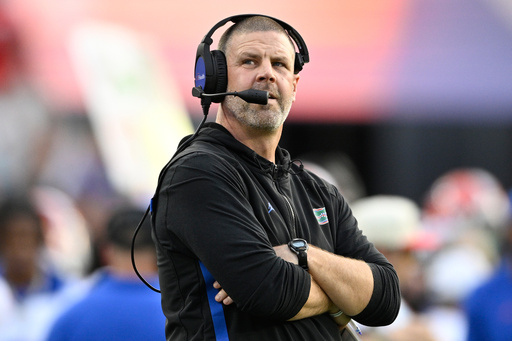
In recent college football discussions covering major conferences like the ACC, SEC, Big Ten, and Big 12, a recurring issue has been prominently highlighted: the challenge of maintaining player loyalty amidst evolving financial opportunities and the lure of the transfer portal.
Arkansas coach Sam Pittman is particularly aware of these challenges, having seen the exodus of most of his 2023 recruits to other programs. He stresses that the departures are not due to inadequate treatment, development, or coaching. Financing and playing time seem to be significant factors driving these decisions. “You’d have to ask those guys,” Pittman remarked, emphasizing the financial aspects.
Over the recent spring, a staggering number of more than 3,000 players from the Bowl Subdivision reportedly entered the transfer portal, suggesting about 22 players per team on average. Despite this trend, Arkansas will retain 10 of its starters, including Cam Ball, a loyal senior defensive lineman and NFL aspirant who has stayed with the Razorbacks since the beginning of his career.
Ball’s commitment to Arkansas is deeply rooted, as he expressed, “I’m loyal to the state of Arkansas; Arkansas has been loyal to me.” While loyalty remains critical, the university is also soliciting increased donor contributions to mitigate the effects of a massive financial settlement. Arkansas athletic director noted the necessity for an additional $12 million annually to stay competitive in the NIL (Name, Image, Likeness) landscape. Recruiting has evolved due to NIL impacts, with Pittman facing the challenge of balancing local talent with financial expectations.
Coach Pittman is not alone in needing recruits to understand the full scope of their potential collegiate experience. Florida’s coach Billy Napier ensures that prospects are aware of the entire package being offered, from academic value to on-field challenges. “We’re selling the degree, the alumni network, the Gator-made program, and you have to be up for the challenge of trying to get Florida back to where it’s been before,” Napier outlines.
Napier’s proactive approach to retention has paid dividends, with Florida’s 2023 recruits largely staying put. His pitch has always been straightforward—setting realistic expectations for life at Florida. “We’re in this thing for the long haul,” he stressed, underscoring the heightened importance of retention in recruiting strategies.
The concerns about player transfers are pressing not just in the SEC, but across other conferences as well. The implications of recent financial settlements have opened a new chapter in player negotiations, extending beyond conventional NIL deals. College football now mirrors professional dynamics more closely, with young athletes increasingly navigating complex legal landscapes in negotiating contracts.
At Louisville, linebacker TJ Quinn shares his familiarity with these negotiations. Now a redshirt senior, he has routinely managed this aspect of his career. “You’ve got to stand your ground with what you feel like is your worth,” he explained. His sense of belonging at Louisville outweighs mere financial considerations.
In this climate, long-term player commitment may serve as a powerful bargaining chip. SMU coach Rhett Lashlee acknowledges the influence of capitalism in these dealings, rewarding players who have proven their worth on the field, while maintaining team harmony by avoiding large discrepancies in player earnings.
Lashlee summarizes the strategy: “Let’s retain first, and then whatever’s left, let’s go build the best team we can for those guys.” Likewise, North Carolina State’s Dave Doeren echoes a similar sentiment, advocating for a merit-based reward system while cautioning against the absence of common sense in broader collegiate negotiations.

